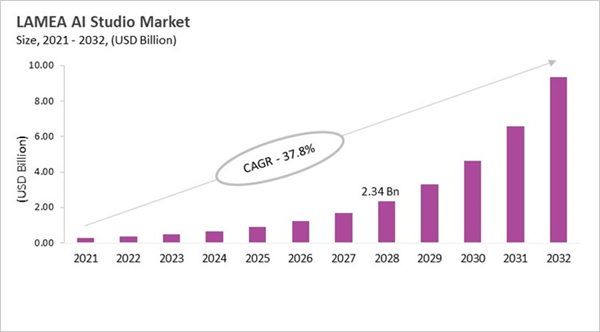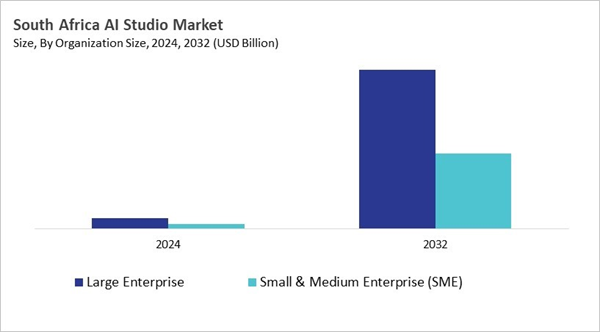The Brazil market dominated the LAMEA AI Studio Market by country in 2024, and is expected to continue to be a dominant market till 2032; thereby, achieving a market value of $1.52 billion by 2032. The Argentina market is showcasing a CAGR of 41% during 2025-2032. Additionally, the UAE market would register a CAGR of 38.9% during 2025-2032. The Brazil and UAE led the LAMEA AI Studio Market by Country with a market share of 18.9% and 15.5% in 2024. The South Africa market is expected to witness a CAGR of 41.4% during throughout the forecast period.
The LAMEA AI Studio market has grown at the crossroads of better cloud infrastructure, national digital agendas, and modernization of businesses in the government, finance, energy, telecoms, healthcare, and retail sectors. The market is heavily influenced by regional dynamics: Middle Eastern AI roadmaps stress data residency, auditability, and sovereign deployment. African privacy frameworks and public-sector modernization push for responsible AI and privacy-by-design. Latin America wants governance-aligned, time-to-value solutions for Spanish- and Portuguese-language workloads. OEMs have increased their compute and storage footprints in key hubs over the past five years. This has allowed studios to offer a wide range of services, from pipeline orchestration to model evaluation, safe-prompt tooling, multilingual adaptation, and cost governance, all while making sure that compliance and incident reporting are part of everyday workflows.
There are three main trends that shape the market: studios that are aware of compliance and sovereignty are now the norm; localization and industry-specific accelerators have moved from pilots to production; and infrastructure proximity and cost governance guide adoption. Top vendors make trust the default by combining regional availability with strong data-handling guarantees, the ability to adapt models to different languages, domain evaluation tools, and secure supply chains. There is a lot of competition between global hyperscalers, regional cloud operators, telco-backed platforms, and agile local specialists when it comes to governance, localization, and cost transparency. Success is becoming more and more dependent on platforms that make policy, compliance, and localization part of the default settings for products. This lets regulated and multilingual businesses in Latin America, the Middle East, and Africa safely and efficiently scale AI.
Organization Size Outlook
Based on Organization Size, the market is segmented into Large Enterprise, and Small & Medium Enterprise (SME). With a compound annual growth rate (CAGR) of 41% over the projection period, the Large Enterprise Market, dominate the South Africa AI Studio Market by Organization Size in 2024 and would be a prominent market until 2032. The Small & Medium Enterprise (SME) market is expected to witness a CAGR of 42.3% during 2025-2032.Deployment Type Outlook
Based on Deployment Type, the market is segmented into Cloud, and On-premises. The Cloud market segment dominated the Brazil AI Studio Market by Deployment Type is expected to grow at a CAGR of 37.8 % during the forecast period thereby continuing its dominance until 2032. Also, the On-premises market is anticipated to grow as a CAGR of 37.3 % during the forecast period during 2025-2032.End-User Sector Outlook
Based on End-User Sector, the market is segmented into IT & Telecom, BFSI, Healthcare, Retail, Manufacturing, and Other End-User Sector. Among various UAE AI Studio Market by End-User Sector; The BFSI market achieved a market size of USD $20.8 Million in 2024 and is expected to grow at a CAGR of 37.7 % during the forecast period. The Manufacturing market is predicted to experience a CAGR of 40.2% throughout the forecast period from (2025 - 2032).Country Outlook
The AI studio market in Brazil is growing quickly due to government policy, more investment from hyperscale companies, and a compliance environment that is becoming more mature, which lets big companies move pilots into production. The Brazilian Artificial Intelligence Strategy (EBIA) sets the stage for research, skills, and sector deployment. The LGPD data-protection regime, which is managed by ANPD, sets a standard for privacy in government, banking, and healthcare applications. Hyperscale infrastructure is growing. Studios are focusing on governance features like dataset documentation, guardrails, and evaluation that are in line with expected regulatory outcomes. Demand is highest in Portuguese-language customer experience, finance, logistics, and oil and gas. There is competition between global hyperscaler studios and domestic SI-led offerings. The main differences are in "Brazil-ready" compliance and vertical libraries. In the short term, growth will depend on how many computers are available, how efficient the models are, and the final AI bill. Studios that provide pre-mapped controls, audit trails, and red-teaming toolchains will be in the best position to help regulated buyers speed up production safely.List of Key Companies Profiled
- Microsoft Corporation
- IBM Corporation
- Google LLC
- Amazon Web Services, Inc. (Amazon.com, Inc.)
- Vonage Holdings Corp. (Ericsson AB)
- Sprinklr, Inc.
- Meta Platforms, Inc.
- Altair Engineering Inc.
- C3.ai, Inc.
- HP, Inc.
Market Report Segmentation
By Organization Size
- Large Enterprise
- Small & Medium Enterprise (SME)
By Offering
- Model Development
- Data Preparation
- Model Deployment
- Collaboration Tools
- Model Monitoring
By Deployment Model
- SaaS (Software as a Service)
- PaaS (Platform as a Service)
By Deployment Type
- Cloud
- On-premises
By End-User Sector
- IT & Telecom
- BFSI
- Healthcare
- Retail
- Manufacturing
- Other End-User Sector
By Country
- Brazil
- Argentina
- UAE
- Saudi Arabia
- South Africa
- Nigeria
- Rest of LAMEA
Table of Contents
Companies Mentioned
- Microsoft Corporation
- IBM Corporation
- Google LLC
- Amazon Web Services, Inc. (Amazon.com, Inc.)
- Vonage Holdings Corp. (Ericsson AB)
- Sprinklr, Inc.
- Meta Platforms, Inc.
- Altair Engineering Inc.
- C3.ai, Inc.
- HP, Inc.










